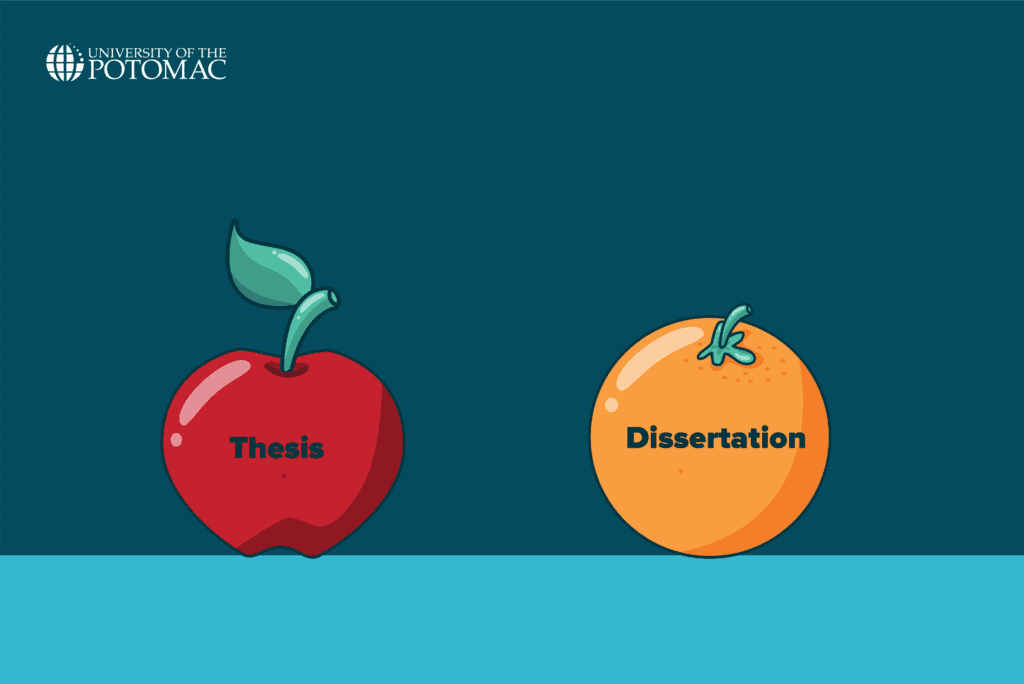Embarking on an academic journey often involves deciphering the complexities of advanced research projects like dissertations and theses. While these terms might seem interchangeable, they possess distinctive changes in the world of higher education. A fundamental distinction between a thesis and a dissertation lies in their approach to research. A thesis typically involves synthesizing existing research and knowledge in your field, while a dissertation requires conducting original research, addressing research gaps, and making a substantive contribution to the academic domain.
As you continue your higher education journey in academia, it’s critical to decipher the fundamental differences between dissertation and thesis that set them apart.
What Is a Thesis?
A thesis is a long-term academic research paper that presents an in-depth review of existing research on a specific subject. It requires extensive research, data collection, analysis, and critical interpretation of the findings. Although some undergraduate programs may mandate a thesis, it is more commonly expected in postgraduate studies, such as upon completing a master’s degree.
What Is a Dissertation?
A dissertation is a longer and more comprehensive research project based on original research. It’s a substantial piece of academic writing required for the completion of a doctoral degree. The dissertation is the culmination of years of research, study, and expertise, contributing valuable insights in a particular field of study.

Dissertation vs Thesis: Key Differences
Both theses and dissertations serve as culminating projects for program graduation, demanding a profound grasp of the research subject and analytical skills to substantiate findings. Despite these commonalities, significant differences set them apart. The key differences include:
Academic and Research Requirements
The academic requirements for a doctoral dissertation are clearly defined hypotheses, a detailed methodology section, rigorous data analysis, and a critical discussion of the results in the context of existing literature.
In contrast, the requirements for a master’s thesis include a thorough literature review, methodology, data analysis, and a conclusion that summarizes the findings.
Research requirements are also more extensive for dissertations compared to theses, as they include conducting original experiments and studies.
Length and Complexity
The length of a dissertation or a thesis varies according to the topic and the method of analysis, or it can vary based on the departmental requirements. Usually, a master’s thesis is around 40-80 pages, sometimes up to 100 pages. A dissertation, however, is significantly longer, ranging from 100 to 300 pages and sometimes up to 400.
Dissertations and theses also vary on the level of complexity. While the thesis requires a thorough literature review and analysis of existing research, it’s less complex than a dissertation. Moreover, the original research is limited, contrary to dissertations involving extensive original research (experiments and studies).
Research Objectives
The research objectives are an essential component that can guide the research project and highlight the specific goals to achieve. Moreover, they outline the grounds for pursuing a particular topic.
However, they can vary depending on the academic level and the nature of the research. In a master’s thesis, the research objectives usually focus on addressing specific research questions related to the chosen topic, to deepen the understanding of existing theories within the field of study. Contrarily, in a doctoral dissertation, the research objectives are broader and are formulated to address complex research gaps, propose new theories, and contribute to the academic field.
Timeframe and Milestones
The timeframe depends on internal factors like the student’s work pace and personal circumstances and external factors like the complexity of the subject, availability of resources, and academic level. While we can’t give a definitive answer, it usually takes a couple of semesters or 1-2 years to complete a master’s thesis. On the contrary, a doctoral dissertation is more time-consuming and can take 4-7 years to complete.
Although there are many similarities between the milestones for completing a thesis and a dissertation, such as topic selection, literature review, and data collection, their differences lie in the higher complexity of doctoral dissertations, including original research, review by the advisory committee, and publication.
Review and Approval Process
The review and approval process is vital to evaluate the quality of research, analysis, and presentation. Although the overall process is similar for both a master’s thesis and a doctoral dissertation, the scrutiny applied to dissertations is notably more rigorous. For a master’s thesis, a committee of professors or advisors within the university’s department evaluates the thesis for adherence to academic standards, clarity, and coherence. Following the review, approval is granted to the thesis if the evaluators are content with the student’s work. On the other hand, for a doctoral dissertation, the review process includes a committee of experts in the field, often external reviewers, to assess the dissertation’s quality, methodology, and contribution to the academic field. The approval process is more challenging as it may require defending the dissertation orally and answering questions from the committee members and to a broader audience than a master’s thesis presentation.
Potential for Publication
Lastly, one of the main differences between a dissertation and a thesis is the potential for publication. As the dissertation is more extensive and requires original research contributing to the academic field, theses are less likely to be published in a peer-reviewed journal. Although a master’s thesis is more narrowly focused, it can still be published as a single article. In contrast, a doctoral dissertation is generally equivalent to at least three articles.
Interested in pursuing a degree?
Fill out the form and get all admission information you need regarding your chosen program.
This will only take a moment.
Message Received!
Thank you for reaching out to us. We will review your message and get right back to you within 24 hours.
If there is an urgent matter and you need to speak to someone immediately you can call at the following phone number:
- We value your privacy.
The Scope of Dissertation vs Thesis
While both require extensive research and dedication, the thesis has a narrower scope on a specific topic within the field of study. It aims to illustrate the student’s mastery of the subject matter, ability to synthesize existing research, and ability to present coherent arguments. On the other hand, the dissertation has a broader scope, encompassing a comprehensive analysis of a complex research problem or exploring interconnected topics in the field. It aims to showcase the student’s expertise and ability to conduct original and independent research and contribute new knowledge in the field.
Conclusion
As we draw the curtain in exploring the factors that differentiate a thesis and a dissertation, it becomes evident that both academic endeavors are crucial in unraveling discoveries. A master’s thesis showcases analytical finesse and a deep understanding of existing theories. And a doctoral dissertation displays new groundbreaking insights, original research, and innovative methodologies. Therefore, while they may have substantial differences, they remain a driving force in shaping the future of academia.
Frequently Asked Questions (FAQs):
What is the main difference between a dissertation and a thesis?
While many factors differentiate a dissertation and a thesis, the main difference is their academic level. A thesis is usually required at the end of a master’s degree program. In contrast, a dissertation is necessary to complete a doctoral degree.
How long does it take to complete a thesis or a dissertation?
The time it takes to complete a thesis or a dissertation depends on the complexity of the research, the availability of resources, and the student’s work pace. Usually, it takes a couple of semesters to complete a thesis at the end of a master’s program. In contrast, completing a doctoral dissertation can take four to seven years.
Is there a difference in the level of research expected in a dissertation vs a thesis?
Although a thesis requires a significant amount of research literature review and analysis of existing studies, a dissertation demands a higher level of original research through identifying research gaps, developing new hypotheses, conducting experiments, and collecting and analyzing data.
Are there any specific publication or accessibility differences between dissertations and theses?
Yes, there are specific publication and accessibility differences between dissertations and theses. Doctoral dissertations are usually published and made public through university libraries or digital repositories. Whereas a master’s thesis is less frequently published in academic journals compared to doctoral dissertations. Theses are often made available within the university’s library or department.










